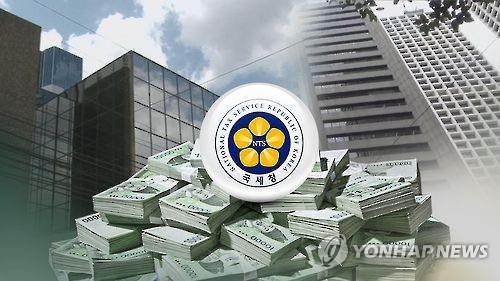South Korea set out new tax code revisions Thursday, seeking to boost corporate investments in new future industries and household income and spending to cope with faltering exports and flaccid domestic demand.
The government finalized the plan at a meeting chaired by Finance Minister Yoo Il-ho in Seoul, and will submit the bill to the National Assembly by Sept. 2 for approval.

It is expected that the new tax code, which includes streamlining tax regulations, will result in 317.1 billion won ($281.4 million) in additional tax revenue in the coming five years.
The government will collect 100 billion won more in taxes from high income earners under the latest tax revision, while it could cut the tax burden on low- and mid-income earners by about 244.2 billion won.
The Ministry of Strategy and Finance said it designed the tax code in order to seek new growth engines and promote fair taxation in the longer term.
"We will strengthen tax support for new technology businesses and the service industry, and build up an employment-friendly tax system in order to boost investment and revitalize the entire economy," the ministry said. "We will also make efforts to stabilize the livelihoods of people by easing their tax burdens."
The tax code revision is in line with the government's latest stimulus package that involves an 11 trillion-won extra budget to minimize fallout from full-scale corporate restructuring in the shaky industries like shipbuilding that will bring about massive layoffs.
The South Korea economy seems to be losing steam as its exports, the key economic driver, have fallen for 18 straight months since the first month of last year. Exports of key items like cars, machinery and petroleum products posted minus growth last month, when outbound shipments posted a 2.7 on-year drop.
The sluggish exports weighed heavily on the country's production side as the capacity utilization rate of the manufacturing sector remained at 72.8 percent and facilities investment-related indicators have stayed low for months.
Retail sales have seemed to offset the downturn in outbound shipments on the back of the government-led tax-cut programs and temporary holidays. But experts are worried that domestic consumption will slow down to some extent in the third quarter as the tax-benefit program finished in June.
The central bank said South Korea's economy grew 0.7 percent on-quarter in the second quarter, remaining below the 1 percent level since the last quarter when it posted a 0.5 percent growth.
Under the new tax code, companies that make research and development investments in 11 selected new industries, such as smart cars, biomedical technologies and renewable energy, will be granted tax credits of up to 30 percent, up from 20 percent.
The government will also offer a 10 percent tax credit for facility investment into those prospect areas.
The entire service sector except for drinking establishments will receive higher tax rewards in accordance with the number of employees. So far, such tax benefits had been given only to 62 percent of the service industry, with swimming pool and ski resort operators, barber shops and coffee shops to be newly added to the list.
The culture content industry is also subject to the expanded tax benefits, as movie and TV drama producers will get a 10 percent tax credit on production costs.
To attract more foreign shoppers, the government will raise the duty-free refund ceiling to 5 million won for purchases from 2 million won and extend the value added tax refund program on cosmetic surgery for foreign patients to December 2017. The refund program was set to finish in March 2017.
The South Korean government will extend the special tax treatment for foreign workers to the end of 2019 but raise their income tax rate to 19 percent from the current 17 percent.
The tax benefits for foreign employees was initiated to attract talented brains to the country but has been under fire for reverse discrimination against local workers.
Aliens who are working in South Korea are subject to a 17 percent flat tax rate on their gross income, while South Korean nationals are charged with an income tax rate of up to 38 percent.
Another pillar of this year's tax revision is easing the financial burden on households and helping them spend more.
The tax revision proposal also includes the extension of income deductions on credit and debit card spending for three more years, but the government will give different tax benefits to people in accordance with their income.
The credit-card spending deduction program was introduced decades ago to encourage people to swipe credit cards in their everyday shopping in order to make the taxable corporate income more transparent. The government has been trying to finish the scheme but faced strong protest as it has become one of the biggest tax rewards that households receive every year.
To address the low birthrate, the government will increase tax credits given to families who have second and third children to 500,000 won and 700,000 won, respectively.
In addition, the government is to raise tax rates levied on soft coal used for coal-fired power generation as part of the government's efforts to reduce greenhouse gas-emitting power plants nationwide. (Yonhap)




![[Exclusive] Hyundai Mobis eyes closer ties with BYD](http://res.heraldm.com/phpwas/restmb_idxmake.php?idx=644&simg=/content/image/2024/11/25/20241125050044_0.jpg)
![[Herald Review] 'Gangnam B-Side' combines social realism with masterful suspense, performance](http://res.heraldm.com/phpwas/restmb_idxmake.php?idx=644&simg=/content/image/2024/11/25/20241125050072_0.jpg)

